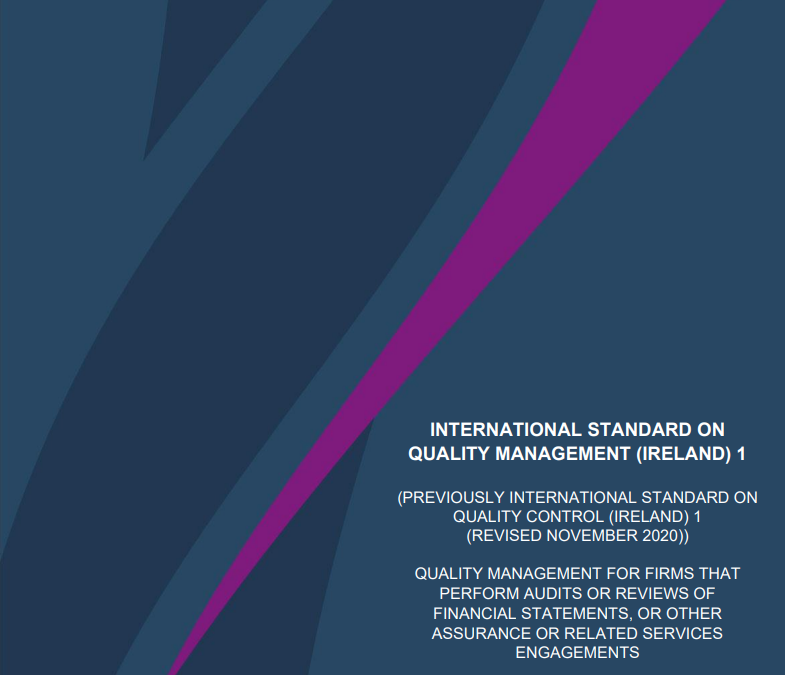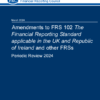
by John McCarthy Consulting Ltd. | Mar 10, 2023 | News
As part of the new ISQM 1 audit quality management standard, there has been much commentary about a new procedure called Root Cause Analysis or RCA.
Root cause analysis is now a compulsory requirement of audit quality control under paragraph 41 of the ISQM. It focuses on understanding the underlying cause behind the deficiencies identified on audit files and in audit quality processes to help provide valuable insights to the firm and help with remedial action.
It’s not practical to apply RCA to every deficiency. Firms will need to design a way of appropriately targeting RCA at the most appropriate reviews and findings.
The selection of deficiencies on which to focus RCA will involve taking the following factors into account:
- The quantum/frequency of the audit risk and/or whether the audit is high profile;
- The reviews it could be applied to, cold file reviews, engagement quality reviews and/or external monitoring reviews;
- The possible selection of all low scoring/graded files, in cold file reviews; and
- Whether the findings in question are recurring themes.
Please go to our website to see our new ISQM TOOLKIT or if you prefer to chat through the different audit risks and potential appropriate responses presented by this new standard, please contact John McCarthy FCA by e-mail at john@jmcc.ie.
We typically tailor training and brainstorming sessions to suit your firm’s unique requirements.
Publications and AML webinars:
- The ISQM TOOLKIT 2022 is available to purchase here.
- See our latest Anti-Money Laundering Policies Controls & Procedures Manual (March 2022) – View the Table of Contents click here.
- Also we have an updated AML webinar (March 2022) available here, which accompanies the AML Manual. It explains the current legal AML reporting position for accountancy firms and includes a quiz. Upon completion, you receive a CPD Certificate of attendance in your inbox.
- To ensure your letters of engagement and similar templates are up to date visit our site here where immediate downloads are available in Word format. A bulk discount is available for orders of five or more items if bought together.

by John McCarthy Consulting Ltd. | Jan 14, 2024 | Blog, News
The International Standards on Quality Management (ISQM) has been effective since December 2022.
It is applicable to all audit firms and is a step-change from the requirements of the, now defunct, ISQC 1. The ISQM introduced:
- a new risk-based quality management approach that requires audit firms to
- design and implement a System of Quality Management (SoQM); and
- operate that system of quality management for audits, reviews of financial statements or other assurance engagements.
Now that the standard has been in effect for just over 12 months, each firm must compulsorily carry out a documented review of their System of Quality Management to assess its effectiveness since coming into force in December 2022.
Part of this assessment before the 2024 audit season commences, will be:
- documenting the results of hot and cold file reviews that took place during 2023;
- analyse the root causes of these findings; and
- extract from these issues the reasons why the more significant/most frequent findings arose;
- decide as a firm how best to avoid repeating the same mistakes; and
- adjust the SoQM accordingly for a more effective audit approach in 2024.
Anyone who may like to migrate to a very user friendly version of the ISQM or use it as a benchmarking tool against which to measure the effectiveness of your current ISQM, may purchase our ISQM Toolkit for €250+VAT here.
Key features:
The Toolkit comprises three parts that are downloadable in Word format, with associated instructions in pdf format.
Part 1 – Setting Objectives and Risks.
Part 2 – Risk Assessment and Responses.
Part 3 – Monitoring and Remediation including Root Cause Analysis (RCA).
The toolkit comes with three additional optional questionnaires to help with documenting an assessment of the firm’s:
- Methodology and software providers;
- Training providers; and
- File review and Technical Queries consultants.
More information on the ISQM Toolkit is available here.
In addition, during 2023 we also published a very helpful IT Controls Assessment questionnaire tool for audit firms to help implement ISA 315.
IT Controls Assessment
Auditors are reminded that there are relatively significant changes in the requirements of ISA 315 Identifying and Assessing the Risks of Material Misstatement which was first applicable for accounting Periods Ended 21 December 2022 and of course Periods Ended 21 December 2023.
Auditors dealing with audits of affected entities will already have adopted new audit programmes in 2023, in additional to the normal audit tests, will also need to assess the entity’s IT controls (no matter what the size of that entity).
This is a significant new development for auditors of SMEs, in particular, and will be a game changer ion the type of audit documentation and evidence of assessment of such IT controls by the auditor on audit files.
For an easy to implement additional (two page) IT Controls Questionnaire to help document the above process, please click on this link to download immediately for only €60 + VAT.
Please also go to our website www.jmcc.ie/training to see our latest:
- Latest updated AML for Accountants webinar (December 2023) which explains the current legal AML reporting position for accountancy firms and includes a quiz. Upon completion, you receive a CPD Certificate of attendance in your inbox. A 20% discount is available for orders of five or more webinars/products, if bought together.
- There are other accounting/audit webinars on the site and more will follow throughout 2024.
- Anti-Money Laundering Policies Controls & Procedures Manual (March 2022) – View the Table of Contents click here.
- letters of engagement and similar templates. Please visit our site here where immediate downloads are available in Word format. A bulk discount is available for orders of five or more items if bought together.
- ISQM TOOLKIT – We can also tailor ISQM training and brainstorming sessions to suit your firm’s unique requirements. The ISQM TOOLKIT 2022 is available to purchase here.

by John McCarthy Consulting Ltd. | Dec 6, 2022 | Blog, News
Root cause analysis (RCA) is a requirement of the new ISQM 1 which comes into effect in less than 10 days. It is one of the eight main components of that standard.
Audit firms will be expected to carry out RCA from 15 December 2022 and have the results and implementation action plan available for inspection by audit monitoring teams in 2023.
RCAs main objective is to examine the more serious audit deficiencies that have occurred during either hot or cold file reviews and involves asking ‘why’ questions, typically five times. The ultimate aim being to prevent them from happening again.
Known as the ‘5 Whys’ technique – it is allegedly attributed to the famously successful Toyota vehicle manufacture process.
In the audit world you might find that the source of a problem is lack of adequate staff training or staff performing audit work with an out of date disclosure checklist – the root problem occurs there.
But what is the root cause of the problem? The answer lies in going deeper by asking why the problem occurred. Asking “Why?” five times requires taking the answer to the first why and then asking why that occurs.
Typically, the process of asking “Why?” leads upstream in the process. It may be a defect that occurs in planning, but the root cause may be in the poor quality of client records, or perhaps a lack of sufficiently critical sceptical thinking on the part of the audit team.
Some typical root cause that we have come across include:
- risk assessment at the planning stage of the audit;
- the extent of audit evidence obtained and the level of documentation; and
- the degree of disclosure within the financial statements.
A common reason for these types of issue is a lack of understanding of the ISAs (Ireland) or accounting standards. Some firms insist on staff reading the ISAs as a basic starting point. What a good idea?
The 2022 book of the ISAs (Ireland) is available from the CAI store here. (We promise we don’t get a commission!). These standards are essential reading for all audit teams, especially with so many modifications to the standards coming into play for accounting periods ending 31 December 2022.
Other reasons that can be root causes include:
- flaws in the design of audit tests and
- inadequate review by senior audit team personnel (i.e. the audit manager or the audit engagement partner) as well as;
- Client familiarity which can play a part in leading to poorer quality audit documentation.
For more assistance please see our new ISQM TOOLKIT or if you prefer to chat through the different audit risks and potential appropriate responses presented by this new standard, please call or e-mail John McCarthy FCA or e-mail him at john@jmcc.ie
Publications and AML webinar
To ensure your letters of engagement and similar templates are up to date visit our site here where immediate downloads are available in Word format. A bulk discount is available for orders of five or more items if bought together.

by John McCarthy Consulting Ltd. | Nov 25, 2022 | Blog, News
Continuing our series of blogs where we looked at the scalability of the ISQM(Ireland) 1, this week we look at the question: ‘What are the Main Elements Within a System of Quality Control (SoQM)?
Establishing the SoQM
ISQM 1.6 requires each audit firm to establish and maintain a system of quality control (SoQM) which includes policies and procedures addressing each of the following six processes:
- Governance and leadership;
- Relevant ethical requirements;
- Acceptance and continuance;
- Engagement performance;
- Resources; and
- Information and communication.
There are two other elements of the SoQM that we have covered in our other blogs –
- The risk assessment and responses;
- The monitoring/remediation stage which includes Root Cause Analysis as a key component.
Each audit firm must have written policies and procedures which ensure that its independence and objectivity cannot be jeopardised by the intervention of any partner or member of staff in the carrying out of an audit engagement.
As well as the above policies/procedures, each audit firm must also have:
- Sound administrative and accounting procedures;
- Internal quality control mechanisms;
- Effective procedures for risk assessment; and
- Effective control and safeguard arrangements for information processing
For more assistance please see our new ISQM TOOLKIT or if you prefer to chat through the different audit risks and potential appropriate responses presented by this new standard, please call or e-mail John McCarthy FCA or e-mail him at john@jmcc.ie
Publications and AML webinar
To ensure your letters of engagement and similar templates are up to date visit our site here where immediate downloads are available in Word format. A bulk discount is available for orders of five or more items if bought together.

by John McCarthy Consulting Ltd. | Nov 21, 2022 | Blog, News
Continuing our series of blogs where we last looked at the key differences between ISQM(Ireland) 1 and its predecessor the ISQC 1 establish quality objectives . This week we look at the question: ‘Is the new ISQM 1 scalable?’
Scalability
According to ISQM 1:34D-3 when designing, implementing and operating a system of quality management (SoQM), each audit firm must take into account the nature and circumstances of the firm and its engagements and ensure that its approach is appropriate. In doing this, the firm shall:
- take into consideration the scale and complexity of the firm’s activities; and
- be able to demonstrate to the firm’s regulatory body and to the Irish Audit & Accounting Supervisory Authority, that the policies and procedures are appropriate.
Saleability example:
For firms with low complexity and flat structures, (for example smaller partnerships) objectives about, for example, the firm’s organisational structure and the assignment of roles, responsibilities and authority may not need to contain a lot of detail. Likewise, sole practitioner auditors or firms with only one or two audit staff, objectives relating to HR much are less likely to be very complex.
Another potential factor to take into account is where there are staff working on audits, who have chosen to opt out of the audit exam topic in their professional examinations, this additional risk factor may need to feature in a firm’s risk assessment. Such staff may need additional one-to-one audit training in the auditing basics, as they have not had the benefit of such a foundation to enhance their audit skills and scepticism.
Networks: There are important objectives in the ISQM 1 for firms that are involved in international Networks. Where firms are not members of networks, they don’t need to consider any of the objectives relating to network resources or requirements.
Group audits: Firms that never participate in group audits are unlikely to need objectives surrounding the cooperation with component or group auditors.
Additional objectives
The standard expects the firm’s SoQM to reflect the firm’s nature and circumstances. This means that there could be circumstances where extra objectives will be required in addition to those provided within the standard.
E.g. in a large, complex firm with multiple offices and strategies including mergers and acquisitions, it is likely that the firm may need to expand the mandatory objectives or provide more granular detail in its objectives and risk assessment. Completely new objectives may need to be added in these circumstances.
In smaller, less complex firms it is much less likely to need to expand the mandatory objectives, although additional granular detail may be useful depending on the circumstances.
In subsequent years, firms must take account of feedback from around the firm and from the RCA (Root Cause Analysis) work to mould new or amended objectives, as the entire SoQM is a continuously iterative process.
Where in doubt, external professional expert advice should be sought.
For more assistance please see our new ISQM TOOLKIT or if you prefer to chat through the different audit risks and potential appropriate responses presented by this new standard, please call or e-mail John McCarthy FCA or e-mail him at john@jmcc.ie
Publications and AML webinar
To ensure your letters of engagement and similar templates are up to date visit our site here where immediate downloads are available in Word format. A bulk discount is available for orders of five or more items if bought together.










